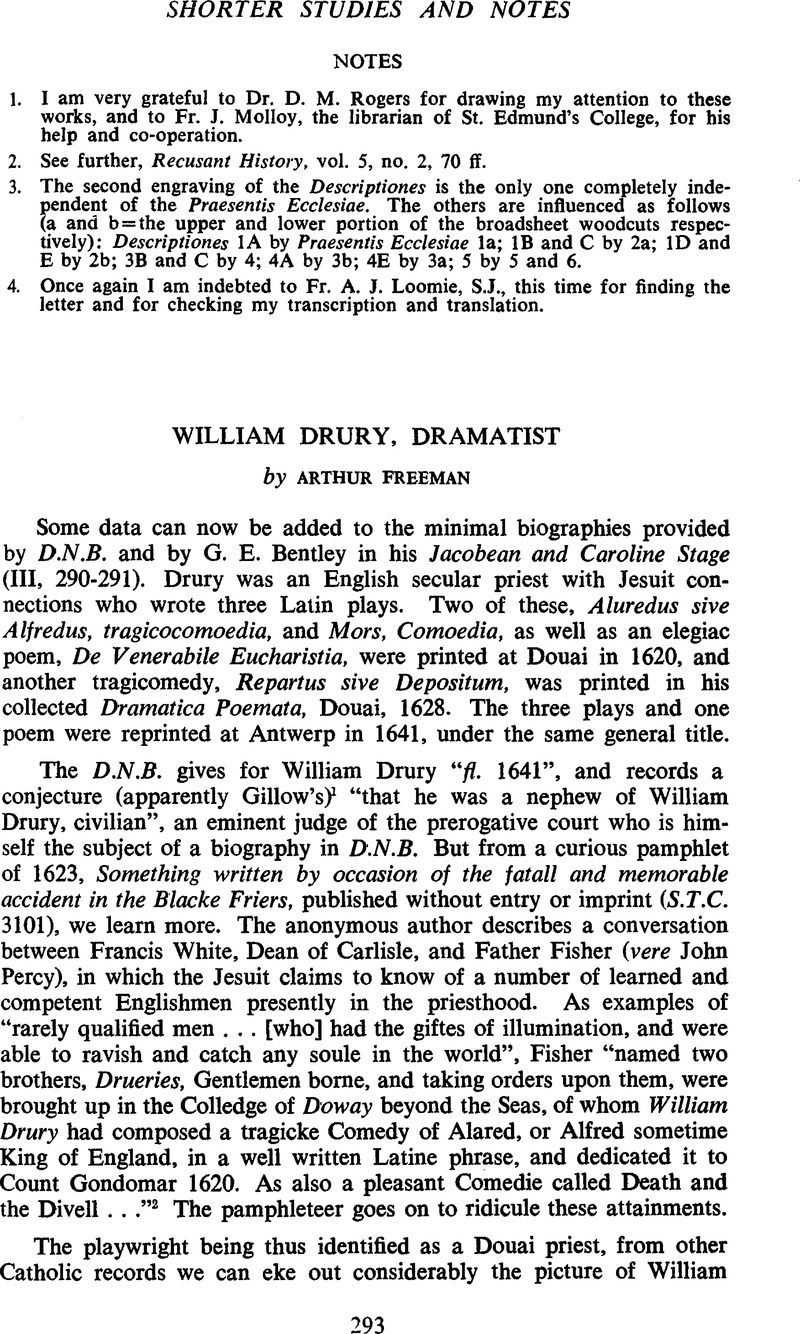Published online by Cambridge University Press: 16 September 2015

1. Gillow, , Bibliographical Dictionary of the English Catholics (London, 1885 &c.), II, 110.Google Scholar Gillow apparently confuses William Drury with the latter's nephew, the son of Sir John Drury, who, like his uncle, was the third of four sons, and figures in the records of the English College at Douai. See below.
2. Something written, C2v-C3r. In Harvard's copy of the pamphlet “Drueries” has been press-corrected to “Druries”.
3. Theabove data given by William Drury himself on enterting the English College at Rome. See The Responso Scholarum of the English College, Rome, Part I, 1598-1621, ed. A. Kenny, C.R.S. LIV, 151-2.
4. See Liber Ruber Venerabilis Collegii Anglorum de Urbe, ed. W. Kelly, I, 139. An inaccurate summary is in Henry Foley, Records of the Society of Jesus (London, 1875-83), VI, 235.
5. Acts of the Privy Council (1617-19), 197-8.
6. Douai College Diaries, III-IV-V, ed. E. H. Burton and T. L. Williams, I, 146 and 172.
7. Ibid., I, 148.
8. Ibid., I, 185.
9. Ibid., I, 186.
10. Foley, Records, V, 1007.
11. MS. Harl. 389, fols. 372-73. This report was originally enclosed in Mead's letter of 8 November (fol. 377), and although Mead cannot identify the author, it is undoubtedly an early draft of Goad's pamphlet, The Doleful Even-Song.
12. Possibly the copies of The Fatal Vesper which survive (in two states) are not this early, for the book was evidently called in and then reissued. See Chamberlain's letter to Carleton (S.P.D., cliv, 17) of 8 November, where the called-in book is unidentified, but also MS. Harl. 389, fol. 381, Mead's letter of 15 November, giving a fuller account and naming the book.
13. The printing history of the two pamphlets is very complicated. See John Crow, “Thomas Goad and The Doleful Even-Song: an Editorial Experiment”, Transactions of the Cambridge Bibliographical Society, I, iii (1951), 238-259.
14. See John Gee's own account in The Foot out of the Snare, 3rd ed. (1624), A4V, D1r, and P2V.
15. [Editors’ note: He evidently worked in the Eastern counties, since he signed his name with other priests in Suffolk in September 1631 to a document attesting the support of the laity in the county for the Bishop of Chalcedon. On 7 October in the same year he again signed a similar declaration with other priests in Norfolk (Westminster Archives, A XXIV, nos. 77, 182).]
16. Foley, Records, VI, 235. [Editors’ note: Foley's ultimate source would appear to be the “Catalogus missionariorum Londini ordinarie commoran-tium 1632” (Westminster Archives, A XXVI, no. 164) a list written by John Southcote (alias Clark) probably to be sent to the clergy Agent in Rome.]
17. S.P.D., cclxxxv, 38.
18. Douai Diaries, I, 293. The younger William arrived on 14 April, 1631, aged nineteen, with a recommendation from his uncle, “Dno Gulielmo Drury presbytero.”
19. Douai Diaries, I, 304,
20. Ibid., I, 312.
21. These kinds of aside by Gee are hardly to be taken seriously, since his whole aim was to bring the Catholic clergy into contempt.
22. [Editors’ note: He may possibly be the “Mr. Drury” who is named among nine members of the Chapter living abroad at Paris or Douai in a list printed in The Pope's Brief. This pamphlet, published by order of Parliament in 1643, prints intercepted Catholic documents which on internal evidence can be dated 1641. These papers clearly form part of the correspondence sent by George Gage (alias Francis Hoard), the secretary of the clergy in England, to Bishop Richard Smith at Paris.]